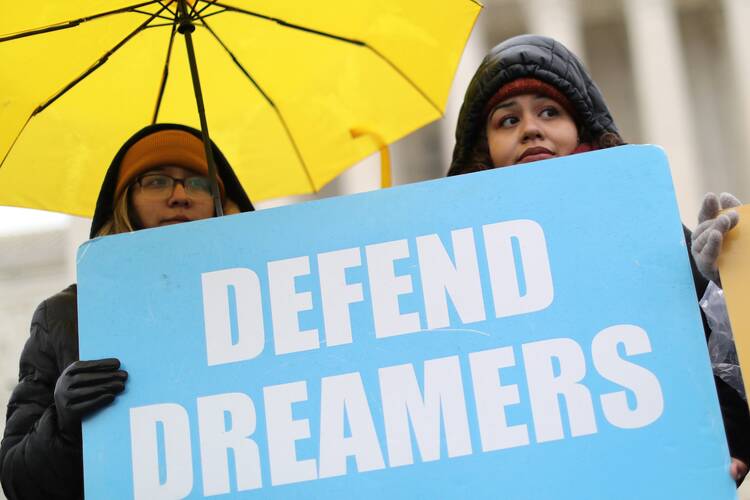~ by Kevin Clarke for AMERICA
J. Kevin Appleby, the acting executive director of the Center for Migration Studies of New York, acknowledges that the U.S. Conference of Catholic Bishops has been a consistent supporter of immigrants and immigration reform, but he says it is time for the bishops to consider a more high-profile gesture for one adjacent issue in particular. His idea: a Mass at the National Shrine in Washington to express support for “Dreamers.”
He is speaking of a unique class of near-Americans citizens – undocumented immigrants, often referred to as Dreamers, who are registered with the federal government under the Deferred Action for Childhood Arrivals program (DACA).
As another in a series of federal court challenges filed by the attorneys general of nine southern states threatens to terminate the program, there is special urgency to address the plight of DACA holders: A ruling against the program could mean that after years of personal and civic struggle, DACA recipients would once again face the possibility of deportation.
DACA holders are not quite citizens and DACA itself does not create a path to citizenship, but they are protected from deportation and allowed to live and work and raise families in the United States. DACA recipients must re-register with the U.S. Citizenship and Immigration Services every two years to remain in good standing with the program. On April 13, President Joe Biden announced that DACA holders will be allowed to access government-funded health insurance programs.

Supporters of Deferred Action for Childhood Arrivals hold signs outside the U.S. Supreme Court in Washington Nov. 12, 2019. Created by President Barack Obama via executive action, the DACA program marked its 10th anniversary June 15, 2022. It protects some young adults brought to the U.S. illegally as children from being deported. DACA beneficiaries are popularly known as “Dreamers.” (CNS photo/Jonathan Ernst, Reuters)
Senator Dick Durbin, a Democrat from Illinois, first introduced the Development, Relief, and Education for Alien Minors Act, known colloquially as the Dream Act in 2001 beginning a legislative odyssey that has now spanned two decades. The act has been reprised and reintroduced every two years since its debut, and major components of the Dream Act have been included in a number of comprehensive immigration reform packages that have likewise failed to make it through Congress.
“Dreamers have lived in America since they were children, built their lives here and are American in every way except their immigration status,” Senator Durbin said. “Passing the Dream Act is a matter of simple American fairness and justice that would provide Dreamers the sense of stability they deserve and a path to lawful permanent residence.”
In an interview with AMERICA, Mr. Durbin stated, “I have never understood the opposition to DACA and the Dreamers,” Mr. Durbin says. Despite the anxieties and fears among some native-born Americans, “immigrants in our country, particularly Dreamers,” he adds, “are teachers, nurses, small business owners and members of the military. We rely on them to keep our economy running, care for our loved ones and provide services in our community. America is a country of immigrants, and we should legislate accordingly.”
In fact, according to FWD.is, an immigration advocacy group, during the COVID-19 crisis, DACA recipients represented 200,000 of the essential workers who were regularly lauded by politicians throughout the pandemic, including nearly 30,000 health care workers.
Many legislators believe that the time for addressing major inconsistencies in the U.S. immigration process is far past due. The current immigration system in the United States in broken, Mr. Durbin says. “It’s been more than 30 years since Congress has passed meaningful immigration reform. We need an orderly process for immigration in America that works for both immigrants and our nation’s security and economy, so that immigrants have lawful pathways to bring their children to the United States.”
Targeted by congressional critics from the start as executive overreach, DACA has run a judicial gauntlet over the last decade. As appeals continue, the fate of the Dreamers may in the end be decided by the U.S. Supreme Court. But despite the court’s conservative majority, “it’s not an automatic assumption that they’re gonna strike it down,” Mr. Appleby says. To read the full account, please click here
